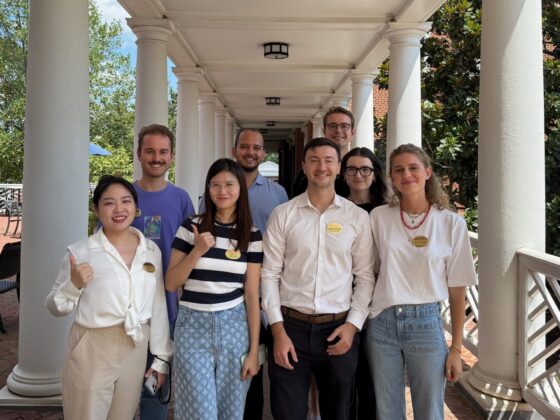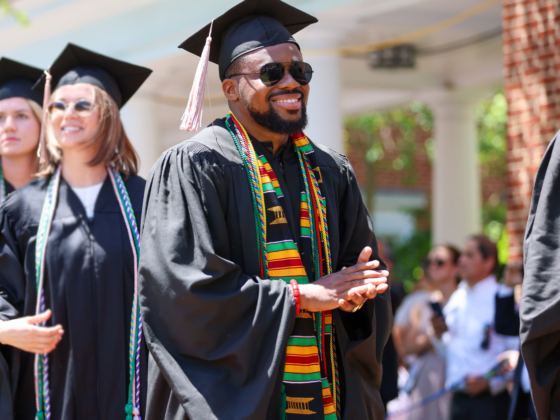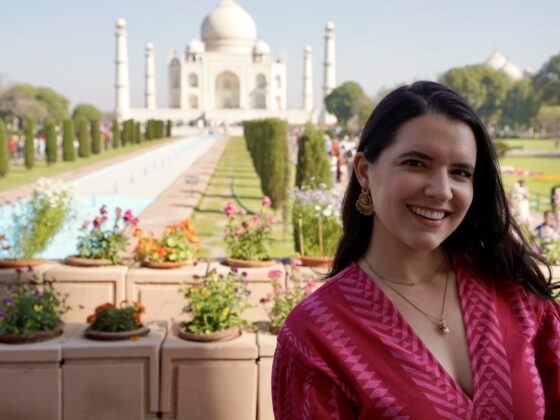Avery Tang (third from right) stands with fellow McKinsey summer interns including Darden classmate Feng Xiaochuan (center)
Second-year student Sijia (Avery) Tang lived in Singapore for four years before completing a bachelor’s degree in Commerce (Accounting and Finance Concentrations) with a double major in Psychology at the University of Virginia. Upon graduation, she worked as a Forensics Advisory Senior Associate and Risk Assurance Experienced Associate for PwC, shifting between their New York, D.C. and Toronto offices. Avery is pursuing a dual degree MBA and M.S. in Data Science at Darden and a career in strategy consulting afterwards.
What interested you in an internship with McKinsey in China over the summer? What was your prior exposure to this area of the world?
Born in China, but having spent the majority of my life in Singapore, Canada, and the U.S., I have always yearned to return home to experience the incredibly diverse and constantly changing business environment of my homeland. Having never formally worked in China before, I chose an internship in China this summer because I wanted to reconnect with the rapidly changing consumer landscape in which I grew up.
What was your experience like interning with McKinsey and Company in China and what are some principal takeaways you gained from your summer internship?
I spent my summer interning in the McKinsey Beijing and Shanghai offices. Over the ten-week internship, I split my time between two engagements (or “studies” as we call them at McKinsey), exposing me to different industries and client challenges that allowed me to see various issues that clients face in the fast-pace, dynamic and always evolving Chinese commercial landscape.
My first study involved assisting a joint venture between two consumer health companies further penetrate the Chinese consumer market in a globally conscious manner. The study spanned across multiple countries, which gave me the opportunity to see how McKinsey helps clients think globally and coordinate locally, especially when working with shifting priorities. In my second study, I helped a global luxury brand client transform its regional core team’s mindset and skillset to reach its revenue growth aspirations. My biggest takeaways from this study were experiencing firsthand how McKinsey helped shape client’s strategic thinking about transformation and empowering the client’s working team to achieve their goals.
One of the most valuable lessons that I learned from my internship was the importance of developing an “ownership mindset.” End-to-end ownership of your assigned work-stream is an absolute necessity in the consulting world. However, the next level of ownership is to constantly think about how to maximize real impact to clients. Part of this ownership also means taking opportunities to dissent, to challenge and to take risks in the client’s interest.
How has your dual track of study in both business administration and data science provided you specific benefits or insights in your internship with McKinsey?
Trends show that there will likely be more digital or data science elements in almost every study down the road – and that is not just the case for China. Over the summer, I observed this trend firsthand and realized how having a background in business and data science allowed me to provide unique value-add to clients, even when functioning as a generalist. More importantly, however, I realized the significance of learning and adapting quickly to changes in the data science field and knowing how to prioritize resources and efforts accordingly.
What differences have you observed between the business cultures of Beijing and Shanghai with that of North American cities like Toronto or D.C.? What do you find are the most influential or interesting aspects of living in China?
Though my internship was based in Beijing, my clients brought me to Shanghai for the majority of my internship. Throughout the internship, I observed that personal experience greatly influences the experience of cultural differences between China and North America, making it difficult to generalize; but, I am happy to share my own experiences and perspectives of the two.
First, I found that the pace of life in China is faster. The consumer market and clients demand speed when adapting to changing customer behaviors. In certain industries or sectors, like tech and consumer retail, business cycles appeared to move quicker in China as stakeholders either swam faster or sunk quicker. For example, teahouses appear on almost every street corner in Chinese cities – while some remain successful, others struggle to compete on sustainable product innovation and securing positive cashflow. Second, to face new and unprecedented trends in China, consultants may have to be more flexible than their U.S. counterparts to work with clients to co-create strategies that are not necessarily established in existing playbooks. The upside of this challenge is the opportunity to collaborate with clients to shape industry thinking.
On a more personal note, living in China gave me one of the most incredible culinary adventures of my life, as I was able to have amazing food on almost a daily basis. Being close to family and reconnecting with old friends was just as rewarding. Also, my McKinsey co-workers regularly organized team events which allowed me to take full advantage of the exciting Shanghai social-scene.
How will you incorporate your learning experiences from this program into your future endeavors? Additionally, how has this experience shaped your post-graduation goals and career plans?
In addition to hard and soft skills I improved upon through on-the-job training, my ten-week internship in China further broadened my interests in the global market. The cross-cultural learning and personal reflection of my internship experience helped me connect dots and drive insights on the implications of cultural commonalities and differences. For example, paying attention to client motivation and ownership of initiatives across different contexts and cultures reveals actions that are more culture-specific from those that are universal. These insights are significant especially as clients’ team structures and initiative contexts constantly change.
China’s market is fascinating and full of potential, and I am excited to explore it in greater depth. Now back in Charlottesville, I also realize how important it is for me to choose a career that allows me to travel globally and continue to grow my global mindset.
Based on my experience over the past two months, I would strongly encourage first-year students who are interested in exploring a new culture to consider applying for an internship abroad. You will be surprised by how much you learn about culture and expand your global mindset, all while bringing the lessons learned in the classroom to real life.





